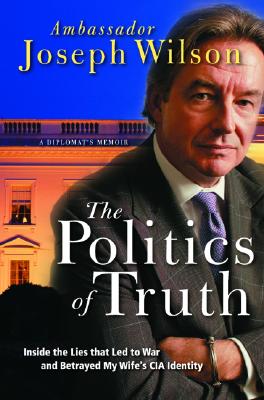

| THE POLITICS OF TRUTH A Diplomat's Memoir1 Joseph Wilson New York: Carroll & Graf Publishers, 2004 |
Rating: 5.0 High |
|||
| ISBN-13 978-0-7867-1378-3 | ||||
| ISBN 0-7867-1378-X | 513p. | HC/BWI | $26.00 | |
The matter of the Bush administration's claim that Iraq tried to purchase uranium ore from Africa is a complex one, involving internal politics, intelligence operations, international relations, and more. But the core of it is very simple to understand:
The question of character figured prominently in the presidential election just past. The Republicans (as did Bush himself) constantly touted Bush's steadfast character: he was resolute in pursuing terrorists, and likewise willing and able to stay the course with all other plans he had initiated. Conversely, the GOP portrayed his Democratic opponent John Kerry as a "flip-flopper", someone whose course changed with the wind. And outside groups,2 notably the "Swift Boat Veterans for Truth", attacked Kerry's performance during the Viet Nam War as cowardly and dishonest, claiming that therefore he was unfit for the high office he sought.
Bush has now been elected to a second term, in part because many people approved of his performance in conducting the current war in Iraq. The Bush administration based its decision to begin that war on the fact that Saddam Hussein, Iraq's bellicose dictator, had chemical and biological weapons and was developing nuclear bombs. Part of its case for that assessment of Hussein's threat was evidence that Iraq had purchased large quantities of uranium ore called "yellowcake" from the African country of Niger. The man who was tapped to investigate the yellowcake sale was an "old Niger hand", former ambassador Joseph Wilson. He reported that the evidence was bogus. After the president repeated the claim in his 2003 State of the Union address, Joe Wilson went public with his side of the story. Instead of refuting his story with other evidence,3 the Bush administration tried to discredit Wilson. When that didn't work, they went after his wife, Valerie Plame. Someone well placed in the administration leaked the fact that she worked as a CIA undercover operative. Some details are still under wraps; but it appears that when outed, she had left that role. Even so, the disclosure could hurt colleagues or the contacts she worked with in other nations. It also is quite likely illegal.4
It behooves us, therefore, when we examine the question of whether president George W. Bush or former ambassador Joe Wilson is telling the truth about the infamous "16 words" — that Iraq had purchased uranium from Niger — that we examine the character of both men. And what better source for that than the testaments of the careers of both men?
The character of Governor and President Bush has been examined in various books, notably Molly Ivins' Shrub (reviewed here) and Bushwacked, and has been on display during his first administration. Ambassador Wilson is not well known to the public. The fact that his book on the "yellowcake" dispute is in fact a memoir shows that he understands the importance of character, and the book is ample information on that score. It reveals a distinguished career as ambassador, including an assignment in Iraq during which he stood up to Saddam Hussein and earned the gratitude of the first President Bush. Further evidence is that, to my knowledge, no one outside the current Bush administration has questioned Wilson's veracity. Since the Yellowcake Controversy began two years ago, surely there has been time to dig up some dirt on him. The fair conclusion is that there is none to find. On the other hand, there is an abundance of evidence that the current president — how shall I put this? — makes "inoperative statements".
I first read Wilson's book in November 2004: hence the date of this review. My only complaint is that Wilson painted with a broad brush, probably out of the need to get something into print in timely fashion. It's a good read, and I recommend it. Quite possibly, it will enhance the reputation of those proverbial "striped-pants boys" — the diplomatic corps.

 To contact Chris Winter, send email to this address.
To contact Chris Winter, send email to this address.